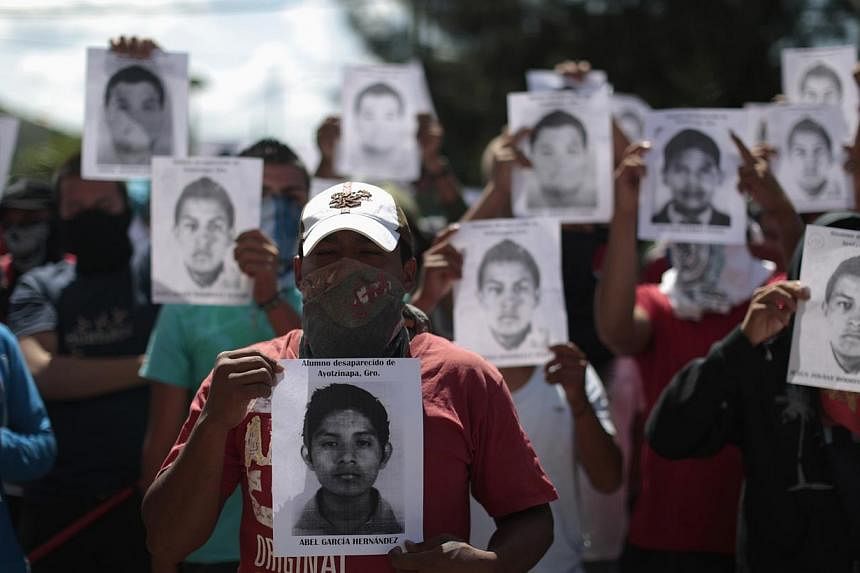IGUALA, Mexico (AFP) - Mexico came under growing international pressure on Tuesday to solve the disappearance of 43 students who vanished after they were attacked by police linked to a drug gang.
The United States and the Organisation of American States joined appeals for the country to find the students, who were last seen 10 days ago in Iguala, a city in the violence-plagued southern state of Guerrero.
Fears over their fate rose over the weekend after authorities found a mass grave up a steep hill outside Iguala containing 28 unidentified and badly burned bodies. Two gang hitmen told investigators they had executed 17 of the 43 students and dumped them in pits. But authorities say it will take at least two weeks for DNA tests to confirm the victims' identities.
"This is a troubling crime that demands a full, transparent investigation," said US State Department spokeswoman Jen Psaki. "The perpetrators must be brought to justice."
OAS Secretary General Jose Miguel Insulza called for "the clarification of the murders that have brought grief not only to the Mexican people but to all the countries of the Americas."
Mexican President Enrique Pena Nieto deployed hundreds of federal police to Iguala on Monday to take over security and disarm the municipal police force.
The attorney general's office dispatched 30 investigators, criminologists and forensic experts to crack the case, which could rank among the most horrific in a drug war that has left 80,000 people dead and 22,000 missing since 2006.
Authorities say the municipal police and its gang allies shot at buses carrying the students on the night of September 26. Several students, from a teacher training college whose radical students often commandeer buses, were later seen bundled into patrol cars. Another bus carrying a football team was attacked outside the city. In all, six people, including three students, were killed before the 43 went missing.
Authorities have detained around 30 people in the case, including 22 Iguala police officers, while the mayor and city security chief are on the run. The rest of the police force was hauled to a military base in central Mexico on Tuesday to undergo evaluations while investigators check if their guns were used in any crimes.
As scores of officers in civilian clothing were put in buses, their wives tearfully claimed their innocence and claimed they would be tortured into forced confessions.
"They always hit to confess to anything," said one of the women.
The motive behind the violence remains a mystery. But an intelligence agency report pointed to possible roles by the now fugitive mayor and his wife, who is the president of the local family services department, known as DIF.
The report, cited by El Universal newspaper, says Maria de los Angeles Pineda Villa told her security chief to ask the police to repel the students because she feared they would interrupt a speech she was giving that day.
After a clash, the public security director ordered his men to stop the students' buses. When they got out of the vehicles, the officers began to shoot, killing three, the CISEN intelligence service document says.
Mayor Jose Luis Abarca Velazquez has said he never knew about the shootings because he was at a party with his wife that night. However, the CISEN document says the mayor actually told the police director to chase and punish the students.
El Universal says intelligence services accuse Abarca and his wife of having links to the Beltran Leyva drug cartel, whose chief Hector Beltran Leyva was arrested in central Mexico last week.
An official in the attorney general's office refused to confirm the document's authenticity, citing secrecy requirements during the investigation.
Vidulfo Rosales, a human rights lawyer representing the victims' families, said last week one theory among the relatives is that the mayor and his wife wanted to prevent the students from interrupting speeches they were both going to deliver.

